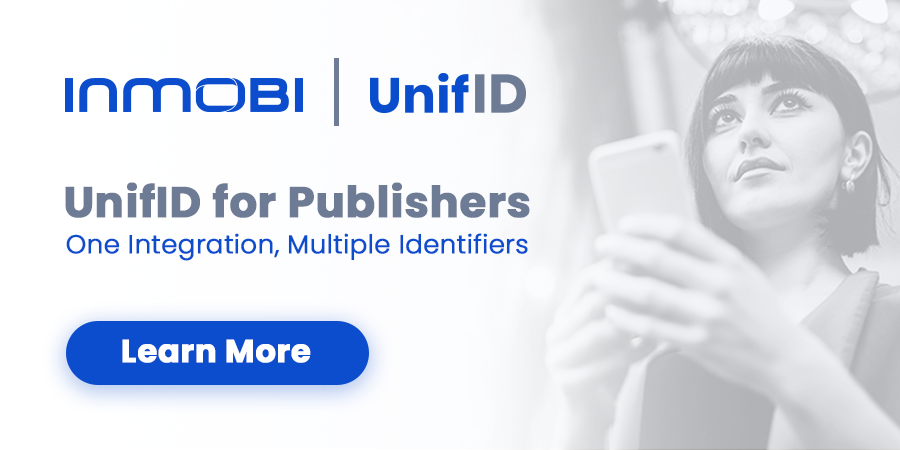This article is sponsored by InMobi Exchange.
Addressability – how brands can reach specific audiences through advertising – is in the spotlight, as legal frameworks (GPDR, CCPA) and privacy initiatives (Google no longer supporting third-party cookies, Apple depreciating IDFAs) impact user-level targeting.
On top of this, the consumer media landscape is now more fragmented than ever, with brands needing to advertise on the web, on mobile, on TV, on CTV, etc., to reach a mass audience.
These trends are leading to the rise of identity solutions which aim to help make audiences addressable across environments. There are now identifiers in the market from The Trade Desk, LiveRamp, ID5, BritePool and others. All have the same goal of helping advertisers better understand their unique audiences no matter where they are consuming media.
This identifier proliferation, however, puts publishers – especially app publishers and developers – in a bind. Mobile apps may be more popular than linear TV, but if in-app inventory is not addressable, then marketers are less likely to advertise there. Supporting multiple identifiers may be a technical headache for app publishers, but it’s now necessary, especially with Apple’s enforcement of App Tracking Transparency (ATT).
The Current State of Identifiers
The consumer journey is increasingly fragmented across environments, so advertisers need a solution capable of providing them with an omnichannel view. Many vendors have rushed to fill this void by offering their own identifier. Yet, the identity solutions market remains quite nascent, with no single offering claiming a majority of market share.
Different identifiers are used in different geographies as well, with advertisers sometimes leveraging multiple options to meet their global needs. For example, a brand may use one identifier for Europe to ensure GDPR compliance, another for the North American market and potentially yet another one for mobile-first regions like APAC.
And yet, the demise of individual tracking solutions like cookies and IDFA, along with privacy regulations like GDPR and CCPA, has accelerated the push to find alternative identity solutions.
The industry is desperately seeking one identity to rule them all, but the market is still quite disparate.
How App Publishers Need to be Thinking About Identifiers
It is in a publisher’s best interest to make their ad inventory more addressable, as more addressable inventory commands higher eCPMs. After all, would you rather spend more to reach an anonymous person or someone you know definitively has a high likelihood of buying your product?
The more that advertisers know about who will be exposed to their ads, the more they are willing to pay. Once Apple begins to enforce ATT, it’s expected that the eCPMs to reach people who do not have Limit Ad Tracking (LAT) enabled could go up by as much as 50% compared to LAT-enabled users.
Since there is no one consensus pick around UIDs, it’s important to work with as many as possible, so that ad inventory is seen as addressable to as many advertisers as possible. In addition, it’s important to not only work with multiple identifiers but also work on improving and increasing access to first-party data by finding ways to encourage users to authenticate/opt into IDFA collection.
App publishers need to work with as many identity solutions as possible, to ensure their inventory is as addressable as possible. And yet, integrating with each identity solution on the market is a major headache, from a legal, technical and financial point of view. So, what can app publishers do to streamline how they work with and integrate with identifiers?
InMobi predicted the incoming challenges associated with navigating a plurality of UID solutions. To make it easier for publishers to work with many different identity solutions, InMobi has developed UnifID. This unique identity offering allows app publishers to easily integrate with multiple identifiers, while collecting permissioned user data and transferring the corresponding identifiers to the upstream demand partners to execute first party-based media buying.
Charting the Future of Advertising Identity
Addressability, identity and consumer privacy will continue to be major themes in programmatic advertising in the months and years to come. By working with multiple identifiers through a single platform, publishers can set themselves up for long-term success and help to ensure that their inventory remains valuable to advertisers.















